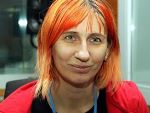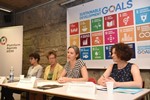Social Watch News
Published on Fri, 2018-07-06 11:21
Could it be the case that the Czech Republic has reached the Scandinavian level of development in terms of equality of men and women? If not, the planned transfer of resources from the field of gender equality makes little sense. Yet, the statistics and our position in international comparison indeed tell us the very opposite. Our society has a long way to go in terms of gender equality. But the leadership of Ministry of Labour and Social Affair is obviously quite content with the current state of affairs, since it plans to withdraw financial support for the promotion of equality of women and men in the labour market. |
| Published on Fri, 2018-07-06 10:48 |
Published on Fri, 2018-07-06 00:00
The Private Sector and the Sustainable Development Goals |
|
Source: . Published on Wed, 2018-07-04 00:00
After many years of women’s, union and human rights movements campaigning against bilateral and regional agreements known as “free trade agreements” or “trade and investment agreements”, the government of the United States of America has taken the opposite direction. President Donald Trump has imposed protective tariffs on steel and aluminum, prompting retaliatory action and sparking a “trade war” with u predictable consequences. Trump intends to renegotiate the North American Free Trade Agreement (NAFTA) and to withdraw from the Pacific Agreement, formerly known as the Trans-Pacific Partnership (TPP), now renamed as the Comprehensive and Progressive Agreement for Trans-Pacific Partnership (CPTPP) by the eleven countries that did sign it. However, these two additional adjectives in the name do not reflect a change in the essence of the agreement pushed by Barack Obama to oppose China’s advance in the region. |
|
Source: . Published on Wed, 2018-07-04 00:00
Después de muchos años de campaña por parte de movimientos de mujeres, sindicales y de derechos humanos en contra de acuerdos bilaterales y regionales llamados “de libre comercio” o “de comercio e inversión,” el gobierno de los Estados Unidos ha pasado a la posición opuesta. El presidente Donald Trump ha impuesto tarifas proteccionistas al acero y el aluminio, con lo que desató medidas retaliatorias e inició una “guerra comercial” de incierto resultado. Trump quiere renegociar el tratado de libre comercio de América del Norte (también conocido como NAFTA, por su sigla en inglés) y ha retirado a los Estados Unidos del Acuerdo del Pacífico, antes conocido como TPP por “Trans-Pacific Partnership” y ahora rebautizado “Tratado Integral y Progresista de Asociación Transpacífico” por los once países que sí lo firmaron. Pero el agregado de dos adjetivos al nombre no refleja un cambio en la esencia del acuerdo que impulsara el presidente Barack Obama para oponerse a los avances de China en la región. |
Published on Tue, 2018-07-03 00:00
Swiss civil society – organized in the Platform Agenda 2030 – presented its report entitled «How sustainable is Switzerland? Implementing the 2030 Agenda from a civil society perspective». Platform Agenda 2030 – Press Release of 3 July 2018 |
|
Source: . Published on Wed, 2018-06-20 00:00
Despite the Czech Republic stagnating in the worldwide effort to bring about gender equality, the country’s government plans to cut funding for equality projects significantly in the coming years. That’s according to the Czech branch of the international NGO network, Social Watch. |
Published on Wed, 2018-06-20 00:00
Despite the Czech Republic stagnating in the worldwide effort to bring about gender equality, the country’s government plans to cut funding for equality projects significantly in the coming years. That’s according to the Czech branch of the international NGO network, Social Watch. Eurostat data sets the country’s pay gap at more than 20 percent, while at the same time the difference between men and women being able to find employment lies at 15 percent. |
Published on Fri, 2018-06-15 14:54
If the International Monetary Fund (IMF) is to respond effectively in the years ahead to the challenges in a world in which both globalization and liberal democracy are increasingly under attack, it will need a different mindset from the modified neoliberalism that currently sets the parameters of its thinking. This is the assessment of Philip Alston, the Special Rapporteur on extreme poverty and human rights, in his latest report to the UN Human Rights Council, which begins its thirty-eighth regular session on Monday (18 June). |
|
Published on Thu, 2018-06-14 13:05
There are increasing warnings of an imminent new financial crisis, not only from the billionaire investor George Soros, but also from eminent economists associated with the Bank for International Settlements, the bank of central banks. The warnings come at a moment when there are signs of international capital flowing out of some emerging economies, including Turkey, Argentina and Indonesia. Some economists have been warning that the boom-bust cycle in capital flows to developing countries will cause disruption, when there is a turn from boom to bust. |
SUSCRIBE TO OUR NEWSLETTER








